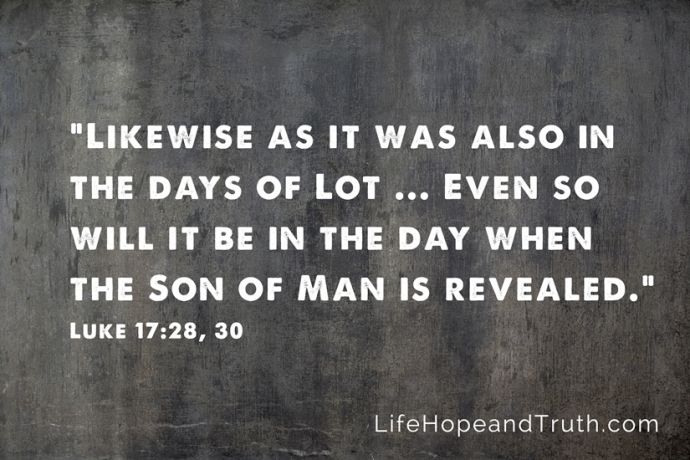Jesus said that end-time events would parallel those in the days before Sodom and Gomorrah’s destruction. What were those conditions, and why is it important?

Abraham’s nephew Lot lived in the ancient city of Sodom up until the time of its destruction (Genesis 14:12; 19:1). Sodom and Gomorrah were among five cities of the lush Jordan valley (Genesis 14:2). The region “was of extraordinary beauty and fertility. … Its appearance was then so attractive as to bear comparison with the garden of the Lord and the land of Egypt” (Barnes’ Notes on the Bible, Genesis 13:10-12).
In spite of the beauty and abundance of good things in those cities, Sodom and Gomorrah were also renowned for their wickedness. Rather than living by God’s instructions, “the men of Sodom were exceedingly wicked and sinful against the LORD” (Genesis 13:13).
So God investigated “the outcry against Sodom and Gomorrah,” and He decided to destroy them in Lot’s day because their sin was “very grave” (Genesis 18:20). It was in God’s perfect judgment that He destroyed these cities, letting them serve as sobering examples for all mankind to learn from.
Jesus Christ said that societies at the end of the age would parallel those in the days of Noah and Lot (Luke 17:26-30). Regarding the time of Lot, Jesus said, “They ate, they drank, they bought, they sold, they planted, they built; but on the day that Lot went out of Sodom it rained fire and brimstone from heaven and destroyed them all” (verses 28-29). The discerning individual will look further into God’s Word to comprehend what Jesus meant.
Paul called the period just before Christ’s return “perilous times.” He said they would be filled with pleasure-seeking, materialism, immorality, violence, idleness and rejection of the things of God (2 Timothy 3:1-5).
Sodom’s evils described
From the creation, Paul explained, mankind quickly began drifting away from God’s ways (Romans 1:20-25). As mankind went astray, men and women began to exchange the wholesome, God-ordained use of sex for vile and shameful passions (verses 26-27). Paul also listed a number of other sinful behaviors that humans began practicing as they turned from God (verses 28-31).
Likewise addressing sexual immorality, the apostle Jude said that Sodom and Gomorrah, “having given themselves over to sexual immorality and gone after strange flesh, are set forth as an example, suffering the vengeance of eternal fire” (Jude 1:7).
What Jude called “strange flesh” (“unnatural lust,” Revised Standard Version) is often called “alternative lifestyles” in our modern age. The term sounds so innocent in our culture, but this denotes sexual behavior that is unnatural and offensive to God (Barnes’ Notes on the Bible, Jude 1:7).
When we read Genesis 19:1-8, it becomes easy to see that this is what both Paul and Jude had in mind. Sodom’s society was steeped in widespread sexual immorality, including homosexual acts and vicious rapes (verses 4-5). The residents of Sodom had become so evil that God could not find even 10 righteous people among them (Genesis 18:32).
More sins of Sodom
In the book of Ezekiel, God listed some of the other sins of Sodom in the context of showing how Judah had become much like Sodom. God told Judah, “Look, this was the iniquity of your sister Sodom: She and her daughter had pride, fullness of food, and abundance of idleness; neither did she strengthen the hand of the poor and needy. And they [the Sodomites] were haughty and committed abomination before Me; therefore I took them away as I saw fit” (Ezekiel 16:49-50).
God also compared the Jewish religious leaders in Jerusalem with the people of Sodom. “They commit adultery and walk in lies; they also strengthen the hands of evildoers, so that no one turns back from his wickedness. All of them are like Sodom to Me, and her inhabitants like Gomorrah” (Jeremiah 23:14).
When the leadership of a society doesn’t set a good moral example and evil is allowed to flourish, the population will generally decline toward the same bad behavior (Ecclesiastes 8:11). To learn more about the similar societal conditions before the Flood in Noah’s day, read “As in the Days of Noah.”
Signs of the times
In his book Slouching Towards Gomorrah (1996), former U.S. Court of Appeals Judge Robert H. Bork explained the roots of American cultural decline and degeneracy. He cited increased violence in and sexualization of mass media, the legalization of abortion and the decline of religion, among other factors. These societal ills are contrary to God’s laws that bring peace, success and strength to any nation.
This is clearly a sign of our time. Our Western societies today are following this same trend of flaunting sin openly and publicly.
Before God destroyed Judah for following the same pattern as Sodom and Gomorrah, He warned His people that they were becoming boastful and unashamed of their blatant sins. God said, “They declare their sin as Sodom; they do not hide it. Woe to their soul! For they have brought evil upon themselves” (Isaiah 3:9).
This is clearly a sign of our time. Our Western societies today are following this same trend of flaunting sin openly and publicly.
God spoke about Judah’s moral decline, asking, “‘Were they ashamed when they had committed abomination? No! They were not at all ashamed; nor did they know how to blush. Therefore they shall fall among those who fall; at the time I punish them, they shall be cast down,’ says the LORD” (Jeremiah 6:15).
We should pay attention to this warning today!
Could disaster strike again?
God preserved the biblical record of Sodom and Gomorrah for every generation to read and take warning. Today the world is heading recklessly toward the edge of a cliff, like a runaway car down a winding mountain road. As humans reject God’s laws of sexual morality and cast off all restraint, without large-scale repentance, eventually disaster will come.
God does not enjoy punishing people (Ezekiel 33:11). God truly desires everyone to repent and turn toward Him, seeking His mercy (Isaiah 55:6-7). But God also does not change His abhorrence of wickedness. Eventually, God will punish everyone who hears and then rejects His laws.
God offers people and nations a way to avoid punishment, saying, “The instant I speak concerning a nation and concerning a kingdom, to pluck up, to pull down, and to destroy it, if that nation against whom I have spoken turns from its evil, I will relent of the disaster that I thought to bring upon it” (Jeremiah 18:7-8, emphasis added).
On the other hand, when a nation rejects God’s merciful warnings, He adds, “And the instant I speak concerning a nation and concerning a kingdom, to build and to plant it, if it does evil in My sight so that it does not obey My voice, then I will relent concerning the good with which I said I would benefit it” (verses 9-10).
Eventually, God’s anger will be aroused against the disobedient, who will be destroyed if they do not repent of their sins (Isaiah 24:1-6; 34:1-3).
The choice is ours
God showed His great mercy when the people of ancient Nineveh repented and turned from their wickedness. When Jonah the prophet warned the city’s inhabitants, the ruler of Nineveh guided his people to turn from their evil ways and from their violence. When God saw their response, He was moved to compassion and reversed His decision to destroy them (Jonah 3:8-10; 4:11).
This account shows that God will withhold punishment if people will humble themselves and turn to Him (also note Malachi 4:5-6).
God has shown us what He requires: “To do justly, to love mercy, and to walk humbly with your God” (Micah 6:8). God tests the heart of every person to see where he or she stands (Jeremiah 17:10).
Will God get our attention before that time? Will He find lasting, heartfelt changes in our behavior before He unleashes His anger? The choice is ours.
Make a commitment to change today. For further study on these subjects, see the articles “What Is Repentance?” and “What Is Conversion?”





